Al Quarawiyin University: The World’s Oldest Operating University and Its Enduring Legacy
Discover the rich history of Al Quarawiyin University in Fez, Morocco — the oldest continuously operating university in the world. Learn about its founding by Fatima al-Fihri, its contributions to global scholarship, and its transformation into a modern educational institution.
CULTURE
Aissam Saadouni
4/21/20254 min read
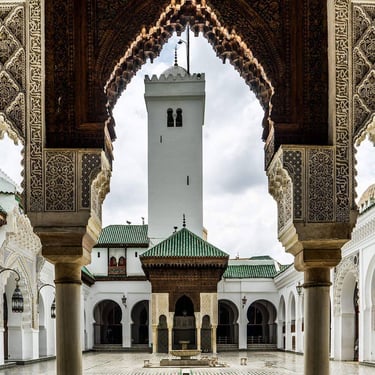
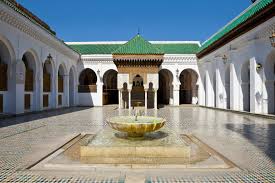
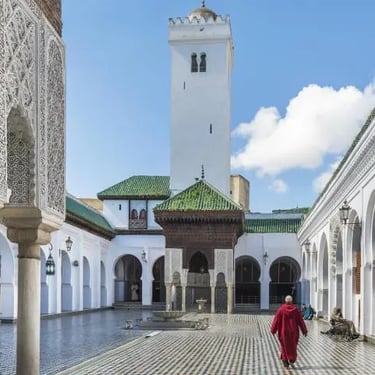
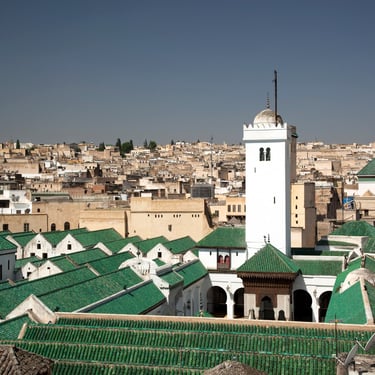
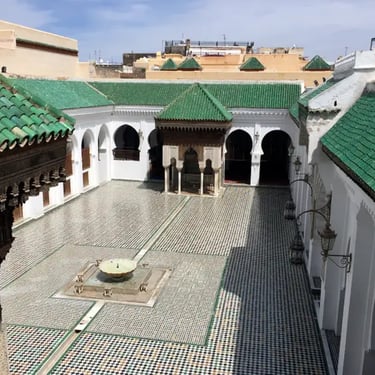
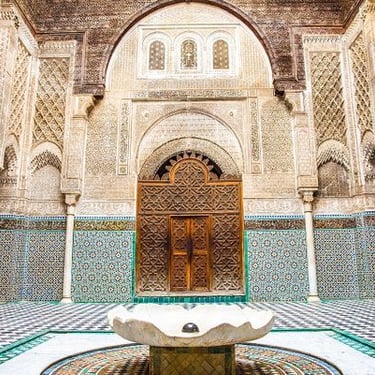
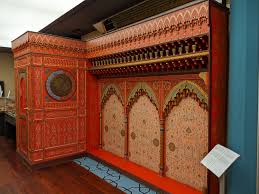
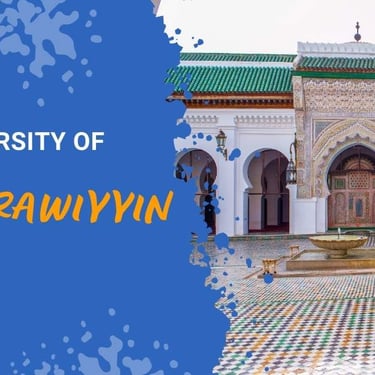
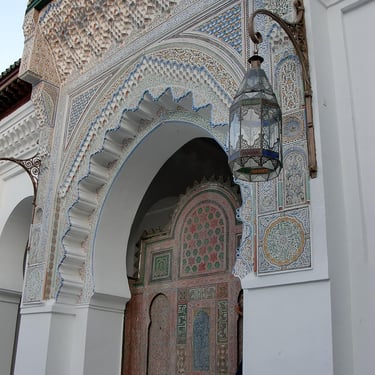
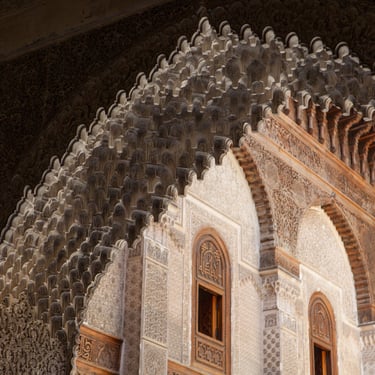
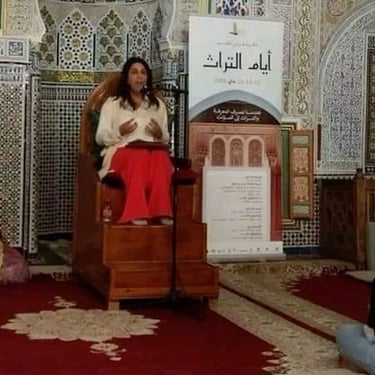
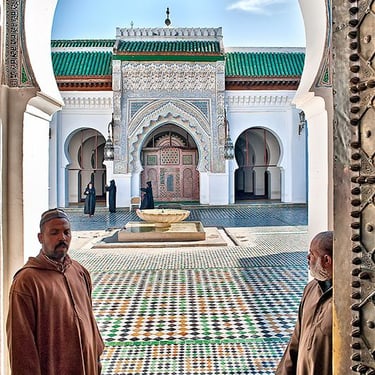
Al Quarawiyin University: A Historic Beacon of Knowledge
Nestled in the heart of Fez, Morocco, Al Quarawiyin University holds a place of distinction in the history of education. Founded in 859 CE by the visionary Fatima al-Fihri, it is recognized as the oldest continuously operating degree-granting university in the world by both UNESCO and the Guinness World Records. Over the centuries, this institution has been a major center of learning, contributing to the intellectual, cultural, and scientific development of the Islamic world and beyond.
The Vision of Fatima al-Fihri
The story of Al Quarawiyin begins with the remarkable Fatima al-Fihri, a woman ahead of her time. Born in Tunisia in 800 CE, Fatima's family relocated to Fez, where they settled and became wealthy. After the death of her father, Fatima inherited a significant fortune and chose to dedicate it to a cause that would benefit her community for generations to come.
With her inheritance, she founded a mosque and madrasa (an educational institution) in Fez in 859 CE. This initiative laid the groundwork for what would evolve into one of the world's most renowned centers of learning. Fatima’s vision was not just to create a space for religious study, but to offer a place where knowledge in a wide range of subjects could be explored, preserved, and expanded. This vision was realized over the centuries as Al Quarawiyin evolved into a beacon of intellectual achievement.
The Evolution into a University
Al Quarawiyin initially functioned as a mosque and madrasa, offering religious and theological education. However, by the 12th century, the institution had already gained a reputation as a major center for Islamic scholarship. Scholars from across the Muslim world, as well as non-Muslim scholars, flocked to Fez to study in the university’s distinguished halls.
The university’s curriculum was diverse and expansive. In addition to religious studies, it included subjects like law, mathematics, astronomy, medicine, music, and natural sciences. The wide-ranging disciplines offered at Al Quarawiyin were indicative of the university’s progressive approach to education, which embraced both the preservation of traditional knowledge and the pursuit of new intellectual frontiers.
In the 14th and 15th centuries, Al Quarawiyin became a vital intellectual hub, where scholars engaged in important scientific and philosophical debates. This period saw the flourishing of great minds who made significant contributions to fields such as mathematics, philosophy, and medicine.
One of the most notable aspects of Al Quarawiyin during this time was its ability to bridge different cultures and intellectual traditions. While it was deeply rooted in Islamic scholarship, the university also engaged with the works of ancient Greek philosophers and scientists, ensuring that the wisdom of the past continued to influence the present.
The Legacy of Scholars
Over the centuries, Al Quarawiyin has been the alma mater for many of the most prominent scholars in history. Among the notable figures associated with the university are Ibn Rushd (Averroes), the famous Andalusian philosopher; Ibn Khaldun, the renowned historian and sociologist; and Moses Maimonides, the Jewish philosopher and physician. These scholars, along with many others, helped to shape the intellectual landscape of the Islamic world and beyond.
The contributions of these scholars were not limited to their immediate areas of expertise. Many of their works were translated into Latin and became highly influential in the development of European thought during the Middle Ages. For instance, Averroes’ commentaries on Aristotle significantly impacted the development of European philosophy, while Ibn Khaldun’s theories on sociology and historiography laid the groundwork for modern social sciences.
The university’s focus on intellectual exchange between scholars of different faiths and backgrounds helped to foster a spirit of tolerance and dialogue, which was especially important during periods of political and religious upheaval. Al Quarawiyin thus played a critical role in the preservation and dissemination of knowledge across cultural and religious boundaries.
Modern Transformation
In the 20th century, Al Quarawiyin underwent significant changes in response to the modernization of higher education in Morocco. In 1963, the university was integrated into the national higher education system, and its academic offerings expanded to include a broader range of disciplines beyond the traditional Islamic studies. This transformation allowed Al Quarawiyin to continue its legacy of excellence while adapting to the needs of contemporary society.
The integration into the modern education system also meant that the university became more accessible to students from various backgrounds. Today, Al Quarawiyin offers a wide range of programs in fields such as the arts, sciences, law, and social sciences. The university continues to maintain its focus on Islamic studies and Arabic language but also provides a modern curriculum designed to meet the demands of a globalized world.
Despite these modernizations, Al Quarawiyin has remained committed to its historic mission of providing quality education rooted in the traditions of intellectual inquiry and cultural exchange. The university continues to attract students from across Morocco and the broader Muslim world, making it a key institution for educational and cultural exchange.
Architectural and Cultural Heritage
The architectural legacy of Al Quarawiyin is equally impressive as its intellectual contributions. The university's mosque, located at the heart of the campus, is a striking example of Islamic architecture, featuring intricate tilework, cedar wood ceilings, and marble columns. The mosque's design reflects the classical Moroccan style and serves as a reminder of the university’s deep cultural and spiritual heritage.
In addition to its architectural beauty, Al Quarawiyin’s location in Fez—one of the world’s oldest and best-preserved medieval cities—adds to its cultural significance. The city of Fez itself is a UNESCO World Heritage Site, and Al Quarawiyin stands as one of its most important landmarks. The surrounding historical district, with its narrow alleyways and bustling souks, provides a rich cultural context for the university's work, offering students and visitors a glimpse into Morocco's vibrant history.
Continuing Influence
Today, Al Quarawiyin continues to be a symbol of Morocco’s commitment to education and cultural preservation. The university not only attracts students from across the Muslim world but also serves as a point of cultural pride for Morocco. It remains a center for research and scholarship, particularly in the fields of Islamic studies and Arabic language. However, its modern curriculum also reflects the growing demands for education in fields such as the sciences, engineering, and social studies.
As the world’s oldest continuously operating university, Al Quarawiyin is a living monument to the importance of education, intellectual exchange, and cultural preservation. It stands as a reminder of the timeless value of knowledge and the role that universities play in shaping the future of humanity.
Al Quarawiyin University is not only the world’s oldest continuously operating university, but it is also a symbol of the enduring power of education to shape societies, preserve cultures, and foster intellectual growth. From its humble beginnings as a mosque and madrasa founded by a visionary woman to its present-day status as a modern university, Al Quarawiyin has remained a beacon of knowledge and a place of intellectual exchange for over 1,100 years. As the world continues to evolve, Al Quarawiyin’s legacy serves as a reminder of the importance of preserving history while embracing progress, and it remains a vital institution for students and scholars worldwide.
Moroccan Association of Perth
Bridging Morocco and Australia through culture and community.
Newsletter
© 2024 - 2025. All rights reserved.
We acknowledge the Whadjuk Noongar people as the Traditional Custodians of the land on which we live and work. We pay our respects to Elders past and present.
Visit our Forest:
Our Stripe Climate Page:




